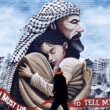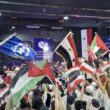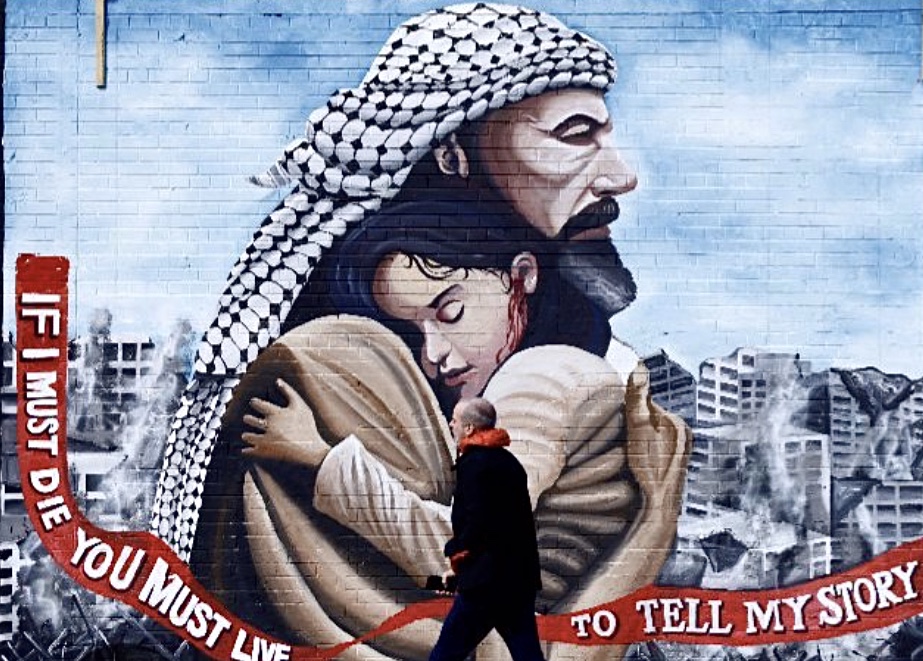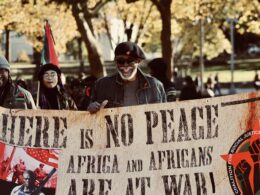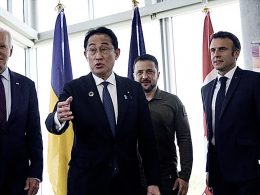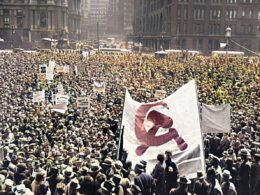This is the first chapter from the book I’m writing, which will be called “When Tears Can’t Save Them: How the pro-Palestine movement failed to stop a holocaust, & how it can still win.” The book will greatly elaborate on its ideas, but this summarizes the arguments it’s going to put forth.
—————————————————
If anyone is listening to me in the world, I say to them I wish you would stop the war for the sake of the children. For the sake of these flowers. For the sake of these wonderful people.
—Khaled Nabhan
Among all of the souls the U.S. government has helped “Israel” murder in Gaza, certain victims have become widely known, like Anne Frank did. So many of this genocide’s targets have been able to have their stories told to the world because today, we have the technology to make such stories instantly accessible to the bulk of humanity. Therefore a lot of the Gaza genocide’s victims have already come to have a legacy that’s comparable to Frank’s. A legacy where someone has been able to live on in the memories of millions, and thereby helped inspire people towards fighting against genocidal beliefs, even though they themselves didn’t survive the extermination.
These victims who’ve captured global attention include Hind Rajab, the six-year-old Palestinian girl who “Israel” murdered by shelling her family’s car while they were fleeing Gaza City; Shaaban Ahmed Al-Dalu, the 20-year-old software engineering student who “Israel” burned to death while he was on an IV; Wafa Aludaini, the Palestinian journalist who “Israel” murdered in an airstrike along with her husband and their two children; and the victim whose story has personally had the biggest impact on me, that being Reem Nabhan.
Reem was three years old when “Israel” murdered her, and during the little time that she’d had with her grandfather Khaled, she had been able to experience the love of somebody who deeply cares for a child. She’d also known what it’s like to have a sibling, Tarek, who “Israel” murdered along with her in an airstrike a month into the genocide. You can find photos of all three of them, living like a family should live. There’s a picture of Khaled holding up Reem while they’re in the streets, with Reem playfully putting her hand on his beard; there’s a picture of Reem and Tarek posing under an archway, with Reem looking at the camera pseudo-seriously and doing a peace sign; there’s a picture of Khaled with both of them, holding up Reem in one arm while putting his hand on Tarek’s shoulder. It’s these kinds of normal little things, so familiar to all of us and so easy to relate to, that have let everyone who’s seen them recognize themselves in the images. Or at least this is true for everyone whose hearts haven’t been destroyed by the dehumanizing propaganda against Palestinians.
The part of the Nabhan family’s story that captured the world’s attention was how Khaled reacted when he lost Reem and Tarek. While Khaled held Reem after the strike, he put her cheek to his, kissed her, and turned to the camera to say: “This is the soul of my soul.” Seeing this was enough to shatter people; and it wasn’t only about the loss the scene showed, it was also about the way Khaled processed that loss during this moment. Khaled knew Reem and her brother weren’t coming back, but this didn’t stop him from showing that love towards them again, the same as if they were still alive. Just because someone is gone, doesn’t mean they can’t keep giving you strength and comfort. Staying connected with them in this way will mean feeling the full scope of the loss, but it also lets you hold on to the soul of your soul. That’s something we can learn from Khaled.
I believe it’s because of moments like these, where seeing the Palestinian people’s loss has reminded us of what we care about the most, that the movement for Palestine’s freedom cannot die. This isn’t a pronouncement on my part, it’s an objective observation: no matter how severe the state’s crackdown against Palestine supporters becomes, the pro-Palestine movement will always keep gaining new supporters and participants. That’s the conclusion which one of my close partners in the communist movement, who here I’ll call Mac, came to while we were talking in November of 2024. Said Mac: “The pro-Palestine struggle will never die, it’s impossible to kill. No amount of repression can end it. The thing that can make it fail, though, is if it gets guided in a direction that makes it ineffective.” And that’s the danger which I seek to investigate in this book: ideas, personalities, and institutions that can lead the pro-Palestine struggle astray, directing the people’s passion for this cause away from what can actually end the genocide.
Throughout the book, I will go into detail about which actions I believe are best, based on what I’ve studied and seen in relation to the pro-Palestine struggle. But for me to make these arguments in a credible way, first I must illustrate why I’ve concluded that the movement’s main initial methods have failed. Or rather why we should connect the objective reality that we’ve been unable to stop the genocide; with the strategies and tactics that the pro-Palestine movement has relied upon.
There’s no question that we haven’t managed to stop our government from continuing the extermination. The January 2025 ceasefire deal did not come about because of the pro-Palestine movement, which had by then lost too much of its earlier momentum to have influence over White House policy; the ceasefire happened because of the Palestinian resistance itself, which had overwhelmed the occupier for the time being. And this means the Palestinians are now in a much worse place than they would be if the U.S. pro-Palestine movement were stronger.
As I write this in February 2025, the Zionist entity keeps bombing Gaza to a lesser extent, while expanding its campaign of atrocities against the West Bank. And Trump has felt totally comfortable with calling for all Gazans to leave, which since they won’t leave amounts to a plan for starving them instead. Given all of these factors which Zionism still has in its favor, it would be no surprise if “Israel” were to start a new campaign of mass bombings, and re-invade the Gaza strip. Though the Palestinian resistance has gained a strategic victory by thwarting the entity’s invasions, and has driven Zionism much closer to internal collapse, the Palestinians have been left to fight this battle while lacking effective allies inside the United States. Which is arguably the most important place for Palestine to have allies, because it’s the U.S. that’s central in providing “Israel” with the means for extermination.
The question that Palestine supporters need to ask ourselves is whether the limitations our movement has run into are simply due to the circumstances we’ve faced; or because of how we’ve navigated these circumstances. We must consider the idea that we could have saved many of the genocide’s victims, or even most of them, if we had done things differently. It’s a painful idea to explore, but we have to explore it, or we won’t be able to adequately wage this struggle during the fight’s next stages.
We’ve made mistakes, and I include myself as among the ones guilty of this; it took me many years of navigating activist circles to recognize that the modern USA’s default organizing habits are counterproductive. The essence of the problem is that for the last half-century or so, our social movements have been operating in a way which keeps them limited; limited to the campuses, and to the non-governmental organizations which co-opt popular struggles. Whenever the NGOs succeed in taking control of a struggle, that struggle ceases to be a popular one, and becomes just another niche; which is the greatest danger the pro-Palestine movement faces at this moment. I’ll go into detail on these co-optation efforts later on, after I’ve thoroughly reviewed the pro-Palestine struggle’s setbacks since October 7. But until then, keep in mind that part of the story: at all times, the NGOs and their adjacent forces have been trying to shape the movement in their image, threatening to take away its vitality and its connection to the masses.
As I’ve looked at the timeline of this atrocity, I’ve come to realize just how totally we failed Khaled; because Khaled is one of the Gazans who would have survived if the pro-Palestine movement had built upon its initial strength, and answered his call for us to stop the killing. “Israel” murdered him on December 16, 2024, when he was only 54. This was half a year into the period where Gaza had been kept out of the regular U.S. news cycle. And it was in the week after Washington had managed to overthrow Syria’s anti-imperialist government, an event that further emboldened the Zionist entity. Had we resisted better, these factors may not have been present, and the entity would have encountered much more severe obstacles by the end of that year. We owe it to Khaled to learn from our errors. We owe it to everyone who’s no longer with us because of how long “Israel,” as well as our own leaders, were allowed to get away with these crimes.
We within the U.S. pro-Palestine struggle have picked this battle because we see ourselves in those who our government wants to eradicate. And when it becomes apparent that our movement has made major mistakes, I trust that the struggle’s participants will work to correct these mistakes. Opportunistic forces will continue to try manipulating the pro-Palestine movement, but this movement’s base is within the people, and the people are not materially invested in the NGOs or the Democratic Party.
These Palestine supporters haven’t sought out to steer the movement in the wrong direction; rather they’ve entered into an organizing environment that’s been thoroughly captured by corrupt interests. And now that the default methods have been exposed as ineffective, many will be inclined to pursue alternative methods. Methods that allow us to make this struggle into more than a protest movement, and build for it a strong, sustainable base within the masses. We need to bring the pro-Palestine cause into the unions. We need to establish worker organizations that function independently from the unions, and thereby can fight without self-constraint regarding Palestine or any other front of struggle. We need to build a united front between the different ideological camps which oppose the genocidal war machine. We need to construct networks within our communities that are designed to let us keep resisting the genocide, even in the event of extreme crackdowns.
These are the practical steps towards ending this holocaust. And they align with a program for revolution because only revolution can truly make our cause succeed. That’s the reality the NGOs seek to obscure: the state that’s behind this holocaust cannot be reformed out of being genocidal. It’s a state whose purpose is to advance monopoly capital’s interests, and the only way to defeat these interests is by bringing this state’s end. There are things we can do to pressure the imperial state into slowing down its campaign of slaughter, and it’s necessary for us to disrupt the war machine’s activities during this pre-revolutionary stage. But we must always do so with revolution as our ultimate goal, using all short-term victories to bring that outcome closer.
The monopoly-aligned forces that seek to co-opt this movement are selling a series of illusions; illusions about which political struggle methods can work, and how much effect one can have merely by holding the right intentions. A movement’s participants can share the most noble intentions possible, such as wanting to save defenseless people from aggression. But unless this intent of ours gets translated into actions that genuinely threaten the empire, we’ll keep failing the Palestinians. To act upon our desire for justice, we must reexamine the ways in which we’ve been trying to wage this fight. We know why we’ve picked the battle; now we have to do what’s needed for winning it.
————————————————————————
If you appreciate my work, I hope you become a one-time or regular donor to my Patreon account. Like most of us, I’m feeling the economic pressures amid late-stage capitalism, and I need money to keep fighting for a new system that works for all of us. Go to my Patreon here.
To keep this platform effective amid the censorship against dissenting voices, join my Telegram channel.
